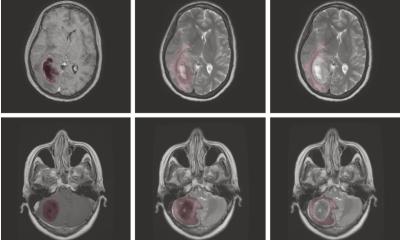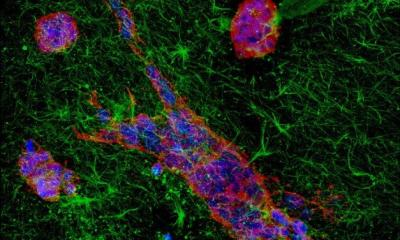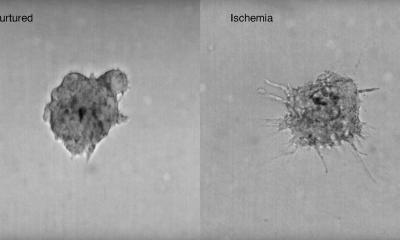
© RUB, Marquard
News • Detecting tumors and metastases
Nanoparticles deliver double strike against cancer
A new nanocomplex renders a tumor harmless – and, on top of that, it trains the immune system to detect and eliminate metastases.
An international research team headed by Dr. Johannes Karges of the Faculty of Chemistry and Biochemistry at Ruhr University Bochum (RUB), Germany, has developed nanoparticles that accumulate in cancer cells and eliminate them after being photoactivated. In addition, they label them in such a way that immune cells learn to eliminate similar cells throughout the body. This means that even undetected metastases can be treated. The researchers present their findings in the journal Nature Communications.
Tumors grow rapidly and uncontrollably, and their tissue is therefore leaky. Unlike in healthy tissues, the nanoparticles therefore accumulate in them easily
Johannes Karges
The malicious nature of cancers means that they spread throughout the body: cells from the primary tumor grow into surrounding tissue and travel through the bloodstream and lymphatic system to distant organs, where they form secondary metastatic tumors. “While we now have effective methods to combat primary tumors, metastases are still very difficult to treat,” explains Johannes Karges. “Ninety percent of people who die from cancer die from metastases and tumor regression, not from the primary tumor.”
Together with an international team, he’s developed a drug packaged in nanoparticles that are administered into the bloodstream. “Tumors grow rapidly and uncontrollably, and their tissue is therefore leaky,” he describes. “Unlike in healthy tissues, the nanoparticles therefore accumulate in them easily.” This also means that the particles preferentially accumulate in tumor cells.
Step 1: treating a known tumor
At the time of administration, the drug is still ineffective. It only takes effect when activated with light. If there are sufficient nanoparticles in a detected tumor, they can be activated by irradiation with light, for example during surgery. After this energy supply, the active species ensures that immunogenic cell death occurs: the tumor cells containing the photoactivated nanoparticles are eliminated, and the tumor treated by this method disappears.
Step 2: sending immune cells on a search
But that’s not all: the nanoparticles and their light-induced effect cause massive oxidative stress in the endoplasmic reticulum of the cells of the treated tumor. “This alerts the body’s own immune system,” explains Johannes Karges. “The immune cells recognize that something is going completely wrong in cells of this type, and that such cells therefore need to be eliminated.” This applies not only to the cells of the photo-treated tumor itself, but to all cells of the same kind throughout the body. “Accordingly, the immune system starts looking for further metastases and renders them harmless,” says Johannes Karges.
The research team proved this active principle in experiments on cancer cells and in animal models. They applied it to effectively treat mice that had been implanted with cells from metastasized and incurable human tumors. “Now, we’re looking for industrial partners who will help us undertake more in-depth studies,” says Johannes Karges. He expects that several more years of development work will be needed before the technology can be widely used in clinical applications.
Source: Ruhr University Bochum
09.09.2023










